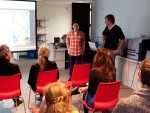Title
Alcohol, cigarettes, nacho cheese, forgetting to wear sunscreen, short fiction … What? Since when did short fiction become bad for you? I was under the impression that short stories are like the asparagus of the literary world—at least that’s how it felt the last time I read one, some eight years ago. (I, like many others of my generation, have read nothing but tweets and blogs for the past year.) But thanks to two guys from Brooklyn, my short story dry spell is over! Andy Hunter and Scott Lindenbaum are the brains behind Electric Literature, an Internet-based quarterly anthology of five short stories that, shying away from the idea that reading is like health food, is marketed as “Reading that’s bad for you!” And it is bad! No, not bad like, “See Spot run,” but bad like sneaking vodka from your parents’ liquor cabinet when you were in high school. Hunter and Lindenbaum came to speak at Juilliard on January 28 as part of the Liberal Arts Department’s lecture series (but, really, I’d have called it more of an informative chill session than a “lecture”).
Body
“Forty bookstores in the entire country carry literary magazines,” Hunter began, “and 12 of them are in Brooklyn and Manhattan.” These numbers don’t seem to want to grow anytime soon. It seems that short fiction is a shrinking field. But is this any surprise in a society where Kindles are quickly replacing full bookshelves? Electric Literature is a response to this technology driven world, with an “if you can’t beat ’em, join ’em” vibe. “Our view was to try to take all of these forces that were apparently threatening literature and try to spin it around and use them to defend it, to reinvent it, and to actually help it find a space,” Hunter explained.
To meet this goal, Hunter and Lindenbaum are putting together anthologies that are downloadable to iPhones and Kindles, in addition to being published as good old-fashioned paperbacks (audiobooks will soon be available). But what about those poor little bookshops? And the joy of flipping pages and smelling the ink? “All we care about is the art form, and so we’re not particularly sentimental about books, even though personally we are,” Hunter said. Lindenbaum added: “The important thing is to make sure writing still has readers.”
Electric Literature is now in its third issue, and its founders have already carved out an image that sets new standards for hip lit pioneers. (Not to judge a book by its cover, but just look at the cover art for the second issue, which involves a kooky image of an old hairy man lying next to a bear, and catching eggs that fall from a multicolored sky.) And it doesn’t hurt that they have an impressive roster of superstars who have already contributed: Michael Cunningham, Colson Whitehead, Rick Moody, Aimee Bender, Jim Shepard, to name a few. But how? “We’re very charming,” quipped Lindenbaum. Agreed. But they also pay their writers for their work. Writers are allowed to submit their stories for free, and each of the authors who are published receives $1,000. And no, the editors don’t live on ramen noodles in order to afford this. Rather, they use a system of print-on-demand. Instead of paying companies up front to print a numerous copies for distribution to bookstores around the country, they pay a company to print each copy as it’s ordered. So as soon as it’s born, each copy has a happy, loving home.
Another innovative aspect of Electric Literature is that video trailers are made to promote each story. The stories are given to an animator and a musician, who are free to do what they want. When Hunter and Lindenbaum showed the trailer for Jim Shepard’s Your Fate Hurtles Down at You, the audience was floored. The few sentences read from the story, paired with haunting imagery and trance-like music, were enough to make me want to run up to the podium, hijack a copy of the first issue, and sit in a corner and not leave until I had finished Shepard’s work. The idea behind these trailers is not just to promote the story; Hunter and Lindenbaum strongly believe in the need for artists to collaborate and interact (can I hear an “amen” from all Juilliard students?!). The videos can be found on the Electric Literature YouTube channel.
If you missed this lecture, fear not! Electric Literature has a Web site where customers can download or order the issues (www.electricliterature.com). Cost for a single issue ranges from $4.70 to $9.95, depending on which format you choose. I just ordered one for my Blackberry. And you should too. Shhh … Just don’t tell your parents.





